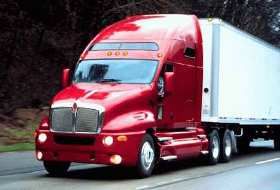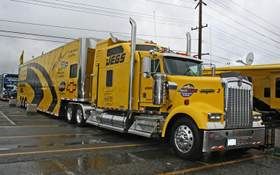Thought That I Was Overpacking
Topic 17520 | Page 1

That's a lot of clothes. You can do laundry on the road.
Isaac replied:
That's a lot of clothes. You can do laundry on the road.
Too many socks? Or too many hats?
Could you be more specific?
John, you've got a pretty complete list. The are several lists of things to bring in the forum. There is a list in a TT blog: Packing List for Truck Driving School. You may consider that your stuff will eventually be added to your road trainer's truck during that phase of your training.
Don't forget your Rand McNally Road Atlas. If you get the deluxe one that's laminated, both wet and dry erase markers will be handy.
Put on a list for later useful tools: small tin snips (for metal seals), vice grips (third hand), hammer (I prefer a large ball-peen, not a class hammer).
Good luck for your next adventure!
Thanks Errol,
I'll only be in Indianapolis for 5 days before I begin my 10K miles with a trainer (finished driver training at the community college and have my CDL in hand).
My deluxe atlas, dry-ease markers, tool bag, CB and ham radios, file box, storage bins, cooler, and additional items, are already packed and loaded (or installed) in my car.
I selected my training items and bags, as well as my solo items, based upon the lists and many discussions here on Trucking Truth.
Do you have any thoughts regarding the number or size of the bags that I've mentioned?
CDL:
Commercial Driver's License (CDL)
A CDL is required to drive any of the following vehicles:
- Any combination of vehicles with a gross combined weight rating (GCWR) of 26,001 or more pounds, providing the gross vehicle weight rating (GVWR) of the vehicle being towed is in excess of 10,000 pounds.
- Any single vehicle with a GVWR of 26,001 or more pounds, or any such vehicle towing another not in excess of 10,000 pounds.
- Any vehicle, regardless of size, designed to transport 16 or more persons, including the driver.
- Any vehicle required by federal regulations to be placarded while transporting hazardous materials.
Two weeks worth of clothes is NOT excessive in my opinion. Sure you can do laundry on the road, but if you have the room go for it. Looks like a good list to me. Laundry may be lower on the list than: Drive, Eat, Sleep, Shower! Good luck.

The sleeping bag liner, that accounts for bed sheet?
Nancy asked:
The sleeping bag liner, that accounts for bed sheet?
Yes, more or less...
It is just a single layered micro-fiber sheet, cut the same size and shape as a sleeping bag (also has a zipper like the bag). Like a sheet, it keeps the bed, or in this case the bag, clean - and is easier to wash and dry than the bag (or bed...). It also provides some extra insulation and warmth if needed and when rolled and stored it is not much bigger than a beer can.
My sleeping bag is a warm weather bag - rated for only 36° F max (45° F comfort) - so the extra insulation provided by the liner is important in the event that the bunk heater in the truck is unable to keep the cab warm (as is often reported by members of this forum). That is also the reason that I have packed two extra micro-fiber blankets.
The blankets are both the sized for a full bed, but store about the size of a half roll of paper towels. By themselves, the blankets don't provide a lot of warmth, but as part of a layered sleeping system along with the bag and liner, just one blanket can add another 10° F of warmth (from my observations and testing). The entire ensemble packs into the space of half a milk crate or about 800 cubic inches and is very light weight (I don't have any notes on weight and have already packed my scale into storage so I cannot report the weight).
Oh, and within that half a milk crate is my two compressible pillows! I like them more than inflatable pillows, even though the take up more space (each one is about 1.5 times the size of a beer can).
Also, and as an addendum to my over packing question:
I'm wondering if I need to pack my bib overalls. I have two pair sitting here - one insulated and one non-insulated.
How often, or how likely will I be out in the elements long enough to need to dress for long exposure to cold weather?
I'm thinking about events like chaining tires, replacing mud flaps, lights, reflectors, etc. An hour or so in the weather with just jeans and a heavy coat may not be so bad (although a change of clothes after the event will likely be needed), but longer than that might require better outer wear. That is why I'm wondering about my overalls.
I also realized that I don't have any thermal underwear (long-johns) packed.
Is there any consensus regarding winter wardrobes during training?

John L wrote:
Also, and as an addendum to my over packing question:
I'm wondering if I need to pack my bib overalls. I have two pair sitting here - one insulated and one non-insulated.
How often, or how likely will I be out in the elements long enough to need to dress for long exposure to cold weather?
I'm thinking about events like chaining tires, replacing mud flaps, lights, reflectors, etc. An hour or so in the weather with just jeans and a heavy coat may not be so bad (although a change of clothes after the event will likely be needed), but longer than that might require better outer wear. That is why I'm wondering about my overalls.
I also realized that I don't have any thermal underwear (long-johns) packed.
Is there any consensus regarding winter wardrobes during training?
Unless you are "flatbedding" or performing other work requiring prolonged periods outdoors, IMO the coveralls are overkill.
A couple pairs of long-underwear, not a bad idea. Consider that a reasonable exterior pre-trip shouldn't require more than 15-20 minutes. Remember you are not required to call-out each individual piece and part checked, so the ET is significantly reduced, thus your time exposed to the elements is far less. In my four years I have had to chain-up once near Flagstaff AZ, and only to safely get me off I-40 and into a TS. A proper trip-plan usually indicates the need for chaining, and most drivers with any sense will avoid a situation requiring them. I think once you are assigned your own truck, the coveralls might be something to carry during the winter months but not while you are training. Rain coveralls is likely a better choice than winter "construction worker" grade though.
In addition, you are a company driver and not required or encouraged to replace mud flaps, or reflectors. I carry fuses, replacement headlight bulbs and the rubber inserts for the glad-hand connections. Beyond that, call your company's Road-Assist or have a truck stop perform this work.
One thing I did not see on your comprehensive list was work gloves. I suggest three different types: fuel gloves with a neoprene surface (keeps the diesel and DEF from contacting your hands), standard weight work gloves and winter weight work gloves. I'd also suggest a reusable zip-lock for storage of the fuel gloves, keeping them isolated from your clothing. I have had great success with Harbor Freight for items like this.
New Reply:
New! Check out our help videos for a better understanding of our forum features

















Preview:









 TT On Facebook
TT On Facebook
It is now less than a week until I report for orientation at Celadon.
In preparation for the journey (and in anticipation of sharing space in a truck with my trainer) I've been packing, sorting, paring-down, and repacking my gear into two, 3-day backpacks. Each pack is about 22" tall, 15" wide, and 8" deep, yielding about 3000 cubic inches of storage each (for a total of 6000 cu in). Strapped to one of the packs, in a piggy-back configuration, is a 1000 cubic inch day pack where I currently store my laptop and writing supplies, but which will also serve as a shower bag to carry my change of clothes and dopp kit.
When both of these bags are filled:
5 pair of jeans (plus one pair on me)
6 oxford shirts (plus on on me)
10 long sleeve t-shirts (plus one on me)
10 pair boxers (see the pattern?)
10 pair socks (and...)
10 bandanna's (and...)
2 light weight jackets (heavy coat will be on me - January in Indianapolis!)
2 pair shoes (boots will be on me)
spare belt
2 fold-able hats (plus one on me, and then I'm dressed)
1 scarf (might be on me...)
1 balaclava (I hope it won't get that cold...)
eyeglasses and spares
shower shoes
sleeping bag (on outside of pack)
sleeping bag liner
2 compressible pillows
microfiber blanket
microfiber towel and washcloth
laundry bag
dopp kit
meds bag
laptop and charger (12V & 120V)
notepad and pens
water bottle
cellphone and charger (12V & 120V)
flashlight and multitool
they seem very big and bulky, so I pulled a 32" duffel bag out of storage: 32x15x15 yields 7200 cubic inches.
Everything except the day pack with the laptop, notepad and pens, and water bottle fit in the duffel with room to spare.
I think the consensus on TT is to bring a single 26" duffel, although it seems that some have suggested packing in two 26" bags.
I therefore think that my two 3-day bags (with the day pack) should fit the bill.
I'm hoping for some comments and/or feedback.
Thanks.